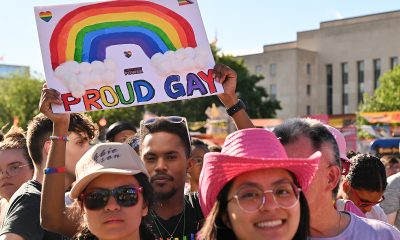National
Clinton talks N.Y. marriage in Pride speech
But no change in her opposition to marriage equality
Secretary of State Hillary Clinton spoke about New York’s new marriage law on Monday acknowledging its importance to the LGBT community and the Empire State — but she didn’t announce a change in her own stated opposition to marriage equality.
During a speech commemorating Pride month at the State Department, Clinton referenced legislation enacting same-sex marriage in New York as a monumental achievement for the supporters of LGBT rights in her audience.
A former U.S. senator from New York, Clinton called the passage of the marriage law a “historic vote” and said it “gives such visibility and credibility to everything that so many of you have done over so many years.”
Later during her speech, Clinton noted during the debate in New York a key vote toward the end was switched in favor of the marriage bill from a Republican senator from the Buffalo area whom Clinton said “became convinced that it was just not any longer fair for him to see one group of his constituents as different from another.” Clinton was presumably referring to State Sen. Mark Grisanti, a freshman senator who had sought office promising to oppose same-sex marriage.
“Senators stood up and talked about nieces and nephews and grandchildren and others who are very dear to them, and they don’t want them being objectified or discriminated against,” Clinton said. “And from their own personal connections and relationships, they began to make the larger connection with somebody else’s niece or nephew or grandchild and what that family must feel like.”
Despite the remarks and her suggestion that the lack of marriage equality in the state enabled discrimination against same-sex couples, the secretary has yet to endorse marriage equality.
Asked whether she supports gay nuptials in November during a forum in Australia, Clinton replied, “I have been a strong supporter of ending discrimination and particularly focusing on hate crimes and workplace bias and the like. I have not supported same-sex marriage. I’ve supported civil partnerships and contractual relationships, yet I am supportive of our states taking actions that they believe reflects the evolution of attitudes about this.”
Clinton’s remarks on the New York marriage win come at a time when President Obama is facing increased pressure to endorse same-sex marriage. Obama has said he’s wrestling with the idea of same-sex marriage, but has yet to endorse marriage equality. As a senior member of the Obama administration, Clinton could feel compelled to toe the line of the president when talking publicly about same-sex marriage.
Richard Socarides, president of Equality Matters, said he thinks it’s important that Clinton publicly state support for marriage equality just as he has called on Obama to declare support for same-sex nuptials.
“Given the office she holds, there are some constraints on her, but I’m not giving her a pass,” Socarides said. “I hope she would soon find the appropriate venue to go further and clearly articulate her support.”
Also during her 14-miunte speech, Clinton referenced the work the State Department has done in the past year to address LGBT issues overseas, including facilitating passage of a resolution at the United Nations recognizing the human rights of LGBT people worldwide.
“And with that we took a huge step forward in our work to refute the hateful suggestion that LGBT people are somehow exempt from human rights protections, and we made it absolutely clear that, so far as the United States is concerned and our foreign policy, and our values — that gay rights are human rights and human rights are gay rights,” she said.
Clinton’s remark that “gay rights are human rights” is a refrain from a line that she ad-libbed during her 2010 speech during a Pride event that received media attention and was echoed during other State Department events.
Identifying other accomplishments in the past year, Clinton also said U.S. ambassador to Italy David Thorne played a role in bringing Lady Gaga to Rome this month for a Pride concert.
“Now, as many of you know, Lady Gaga is Italian American and a strong supporter of LGBT rights,” Clinton said. “And the organizers of the EuroPride event desperately wanted her to perform, and a letter to her from Ambassador Thorne was instrumental in sealing the deal. Over 1 million people attended the event, which included powerful words in support of equality and justice.”
Additionally, Clinton said State Department workers help instigate action in Honduras in the past year after more than 30 LGBT people were murdered and investigations in these anti-gay crimes seemed to be heading nowhere.
“Then our embassy team got involved,” Clinton said. “They publicly called on the Honduran government to solve the murders, bring the perpetrators to justice, do more to protect all Hondurans from harm. Soon after, the government announced it was creating a task force to investigate and prevent hate crimes. And with the help of a United States prosecutor and detective, which our embassy arranged to be made available to assist in this effort, we are making progress.”
Clinton was warmly received during the event by her audience at the State Department, which consisted largely of State Department employees and LGBT rights supporters. The event was held by GLIFFA, or Gays & Lesbians in Foreign Affairs Agencies, the LGBT affinity group for State Department workers.
The complete text of Clinton’s speech follows:
Secretary of State Hillary Rodham Clinton
At an event co-hosted by the Department of State and Gays and Lesbians in Foreign Affairs Agencies (GLIFAA) in celebration of LGBT Pride Month
June 27, 2011
Dean Acheson Auditorium
Washington, D.C.
SECRETARY CLINTON: Thank you all. Thank you. Thank you all very much. Thank you.
Well, this is an especially momentous and extraordinary time for us to meet for the State Department’s annual Pride celebration, the third event we’ve had here at State since I became Secretary, and the first following the historic vote in New York, which I think gives such visibility and credibility to everything that so many of you have done over so many years, because I look out at this audience and I see a lot of familiar faces of people who have been on the frontlines for many years and have worked so diligently and smartly for the progress that we are seeing.
I do want to recognize, in addition to John, Patrick, and Arturo, who have already been mentioned, Under Secretary Otero and Assistant Secretary Posner and USAID Deputy Director Steinberg and Deputy Assistant Secretary Baer and all who have led our efforts, including Counselor Mills, to protect the rights and well-being of LGBT people worldwide. And I thank Jon Tollefson and GLIFAA for being an invaluable partner in coordinating personnel and policy matters here at State. I’m very honored to receive this award. It really belongs to all of you and so many others in recognition of the work that we’ve had the opportunity to do together to advance equality around the world.
It is an inspiration, however, to keep working, because we have a long way to go toward a world that affords all people the respect, dignity, and equality that they are entitled to. So in that vein, I wanted to share just a few stories from the past year that I hope will keep us going because they are stories of perseverance and creativity by our Foreign Service officers and civil servants who are representing the United States.
In Honduras, as many of you know, anti-gay violence increased significantly in 2009 and 2010. More than 30 LGBT people were murdered and the investigations into those crimes appeared to be going nowhere. Then our Embassy team got involved. They publicly called on the Honduran Government to solve the murders, bring the perpetrators to justice, do more to protect all Hondurans from harm. Soon after, the government announced it was creating a taskforce to investigate and prevent hate crimes. And with the help of a United States prosecutor and detective, which our Embassy arranged to be made available to assist in this effort, we are making progress. And I particularly want to thank and recognize Assistant Secretary Valenzuela, because it was his leadership on this issue that really made a difference.
In Slovakia, the country’s first-ever Pride parade last year ended in violence. So this year, our Embassy staff worked overtime to help make the parade a success. They brought together more than 20 chiefs of mission from other nations to sign a public statement of support for the march. They hosted a respectful, productive debate on LGBT rights. And on the day of the parade, our ambassador marched in solidarity right next to the mayor of Bratislava.
And then there is the work that our Embassy team in Rome has been doing. Two weeks ago, they played an instrumental role in bringing Lady Gaga to Italy for a EuroPride concert. (Laughter.) Now, as many of you know, Lady Gaga is Italian American and a strong supporter of LGBT rights. And the organizers of the EuroPride event desperately wanted her to perform, and a letter to her from Ambassador Thorne was instrumental in sealing the deal. Over 1 million people attended the event, which included powerful words in support of equality and justice.
And then there is the tremendous work that our diplomats have been doing in regional and international institutions to strengthen a shared consensus about how governments should treat their citizens. And we’ve made the message very consistent and of a high priority. All people’s rights and dignity must be protected whatever their sexual orientation or gender identity.
In March, President Obama and Brazilian President Rousseff announced their shared support for the creation of a special rapporteur for LGBT rights within the Inter-American Commission for Human Rights. And we have our Bureau for Western Hemisphere Affairs and our permanent mission to the OAS to thank for that.
Also in March, the United States led a major effort at the Human Rights Council in Geneva to get other countries to sign on in support of a statement on ending violence and criminalization based on sexual orientation and gender identity. In the end, 85 countries signed the statement, 18 more than ever had signed onto any previous UN statement on LGBT rights.
And in the very next session of the Human Rights Council, just two weeks ago after another major push by American diplomats in Geneva as well as our teams from IO, DRL, EUR, WHA, and other bureaus, the Council passed the first ever UN resolution recognizing the human rights of LGBT people worldwide. And it was especially meaningful that we had South Africa cosponsoring that resolution with us. And with that we took a huge step forward in our work to refute the hateful suggestion that LGBT people are somehow exempt from human rights protections, and we made it absolutely clear that, so far as the United States is concerned and our foreign policy, and our values – that gay rights are human rights and human rights are gay rights.
Now, it is not just momentous achievements like the Human Rights Council resolution that contribute to progress; it is the day-to-day work of our embassies and AID missions around the world to increase engagement around the issues affecting LGBT rights, especially in those places where people are at risk of violence, discrimination, or criminalization. That’s a concern that Johnnie Carson, our assistant secretary for African Affairs, who is currently on travel to Africa, raises regularly with his African leader counterparts; the op-ed that our ambassador to Barbados wrote in support of LGBT rights; the work that our Eric Schwartz, our assistant secretary for Population, Refugees, and Migration is doing to lead the training of humanitarian workers to better protect and assist LGBT refugees and asylum seekers; the discussions that undersecretary Maria Otero led about the human rights of LGBT people in our first Global Issues Dialogue with Norway.
And so I want to applaud all of our diplomats and our development experts who continue to reach out to those advocating around the world in Uganda, Malawi, Russia, Turkey, China, and so many other places. Our colleagues are meeting with human rights activists, health authorities, youth activists, sex workers, the full range of people who are involved in and working to protect LGBT people’s rights and lives. This is people-to-people diplomacy at its best.
Now, all this progress is worth celebrating, but we cannot forget how much work lies ahead. Because let’s just face the facts: LGBT people in many places continue to endure threats, harassment, violence – including sexual violence – in public and private. They continue to flee their homes and nations and seek asylum because they are persecuted for being who they are. They continue to be targeted for trying to build public support through pride activities such as parades. And what we have long thought is becoming the case, and that is if we can convince people to speak out about their own personal experiences, particularly within their own families, it does begin to change the dialogue.
If you followed closely, which I’m sure all of you did, the debate in New York, one of the key votes that was switched at the end was a Republican senator from the Buffalo area who became convinced that it was just not any longer fair for him to see one group of his constituents as different from another. Senators stood up and talked about nieces and nephews and grandchildren and others who are very dear to them, and they don’t want them being objectified or discriminated against. And from their own personal connections and relationships, they began to make the larger connection with somebody else’s niece or nephew of grandchild and what that family must feel like.
So we have to continue to stand up for the rights and the well-being of LGBT people, and sometimes it’s hard when you’re in the middle of a long campaign to see where you’re getting. But I’ve always believed that we would make progress because we were on the right side of equality and justice. Life is getting better for people in many places, and it will continue to get better thanks to our work. So I ask all of you to look for ways to support those who are on the front lines of this movement, who are defending themselves and the people they care about with great courage and resilience. This is one of the most urgent and important human rights struggles of all times. It is not easy, but it is so rewarding.
Pride month is a time for gratitude, for joy, and of course, for pride – pride in ourselves, in our families and friends, in our colleagues, in our community. And at the State Department, there are so many reasons for pride, and the same is true for all of our foreign affairs agencies represented here, from AID to the Peace Corps and others, because we do have so many talented people, and we have so many who are LGBT serving our nation with honor, courage, and skill. And shortly, our military partners will be able to say the same.
So think of the amazing work that has been done in the last year or two, because it truly is a great tribute to those who have fought for these rights, for those who have sacrificed for them, and mostly for our country, because it is our country and our values that truly are being put at the forefront.
And so I say to all of you, thank you. You make our country proud and you make me proud as the Secretary of State to work with you and serve with you every day. But please don’t forget that for every proud moment we can share together, there are so many around the world who live in fear, who live in shame, who live in such difficult circumstances. And our work must continue until they have the same opportunity that all of you and so many other Americans have, which is to be recognized for who you are and to be given the respect that you so richly deserve.
Thank you all very much.
The White House
As house Democrats release Epstein photos, Garcia continues to demand DOJ transparency
Blade this week sat down with gay House Oversight Committee ranking member

Democrats on the House Oversight Committee have released new photos from Jeffrey Epstein’s email and computer records, including images highlighting the relationship between President Donald Trump and the convicted sex offender.
Epstein, a wealthy financier, was found guilty of procuring a child for prostitution and sex trafficking, serving a 13-month prison sentence in 2008. At the time of his death in prison under mysterious circumstances, he was facing charges of sex trafficking and conspiracy to traffic minors.
Among those pictured in Epstein’s digital files are Trump, former President Bill Clinton, former Trump adviser Steve Bannon, actor and director Woody Allen, economist Larry Summers, lawyer Alan Dershowitz, entrepreneurs Richard Branson and Bill Gates, and Andrew Mountbatten-Windsor.
One photo shows Trump alongside Epstein and a woman at a Victoria’s Secret party in New York in 1997. American media outlets have published the image, while Getty Images identified the woman as model Ingrid Seynhaeve.
Oversight Committee Democrats are reviewing the full set of photos and plan to release additional images to the public in the coming days and weeks, emphasizing their commitment to protecting survivors’ identities.
With just a week left for the Justice Department to publish all files related to Epstein following the passage of the Epstein Files Transparency Act, which requires the Justice Department to release most records connected to Epstein investigations, the Washington Blade sat down with U.S. Rep. Robert Garcia (D-Calif.), the ranking member on the Oversight Committee to discuss the current push the release of more documents.
Garcia highlighted the committee’s commitment to transparency and accountability.

“We’ve said anything that we get we’re going to put out. We don’t care who is in the files … if you’ve harmed women and girls, then we’ve got to hold you accountable.”
He noted ongoing questions surrounding Trump’s relationship with Epstein, given their long history and the apparent break in friendship once Trump assumed public office.
“There’s been a lot of questions about … Donald Trump and Jeffrey Epstein. They were best friends for 10 years … met women there and girls.”
Prior to Trump’s presidency, it was widely reported that the two were friends who visited each other’s properties regularly. Additional reporting shows they socialized frequently throughout the 1990s and early 2000s, attending parties at Trump’s Mar-a-Lago resort in Florida and Epstein’s residences. Flight logs from an associate’s trial indicate Trump flew on Epstein’s private jet multiple times, and Epstein claimed Trump first had sex with his future wife, Melania Knauss, aboard the jet.
“We’ve provided evidence … [that leads to] questions about what the relationship was like between Donald Trump and Jeffrey Epstein.”
Garcia stressed the need for answers regarding the White House’s role in withholding information, questioning the sudden change in attitude toward releasing the files given Trump’s campaign promises.
“Why is the White House trying to cover this up? So if he’s not covering for himself … he’s covering up for his rich friends,” Garcia said. “Why the cover up? Who are you hiding for? I think that’s the question.”
He confirmed that Trump is definitively in the Epstein files, though the extent remains unknown, but will be uncovered soon.
“We know that Trump’s in them. Yeah, he’s been told. We know that Trump’s in them in some way. As far as the extent of it … we don’t know.”
Garcia emphasized accountability for all powerful figures implicated, regardless of financial status, political party, or personal connections.
“All these powerful men that are walking around right now … after abusing, in some cases, 14‑ and 15‑year‑old girls, they have to be held accountable,” he said. “There has to be justice for those survivors and the American public deserves the truth about who was involved in that.”
He added that while he is the ranking member, he will ensure the oversight committee will use all available political tools, including subpoenas — potentially even for the president.
“We want to subpoena anyone that we can … everyone’s kind of on the table.”
He also emphasized accountability for all powerful figures implicated, regardless of financial status, political party, or relationship with the president.
“For me, they’re about justice and doing the right thing,” Garcia said. “This is about women who … were girls and children when they were being abused, trafficked, in some cases, raped. And these women deserve justice.”
“The survivors are strong.”
Deputy White House Press Secretary Abigail Jackson issued a statement regarding the release the photos, echoing previous comments from Republicans on the timing and framing of the photos by the Oversight Committee.
“Once again, House Democrats are selectively releasing cherry-picked photos with random redactions to try and create a false narrative,” Jackson said.
“The Democrat hoax against President Trump has been repeatedly debunked and the Trump administration has done more for Epstein’s victims than Democrats ever have by repeatedly calling for transparency, releasing thousands of pages of documents, and calling for further investigations into Epstein’s Democrat friends,”
In a press release on Friday, Garcia called for immediate DOJ action:
“It is time to end this White House cover-up and bring justice to the survivors of Jeffrey Epstein and his powerful friends. These disturbing photos raise even more questions about Epstein and his relationships with some of the most powerful men in the world. We will not rest until the American people get the truth. The Department of Justice must release all the files, NOW.”
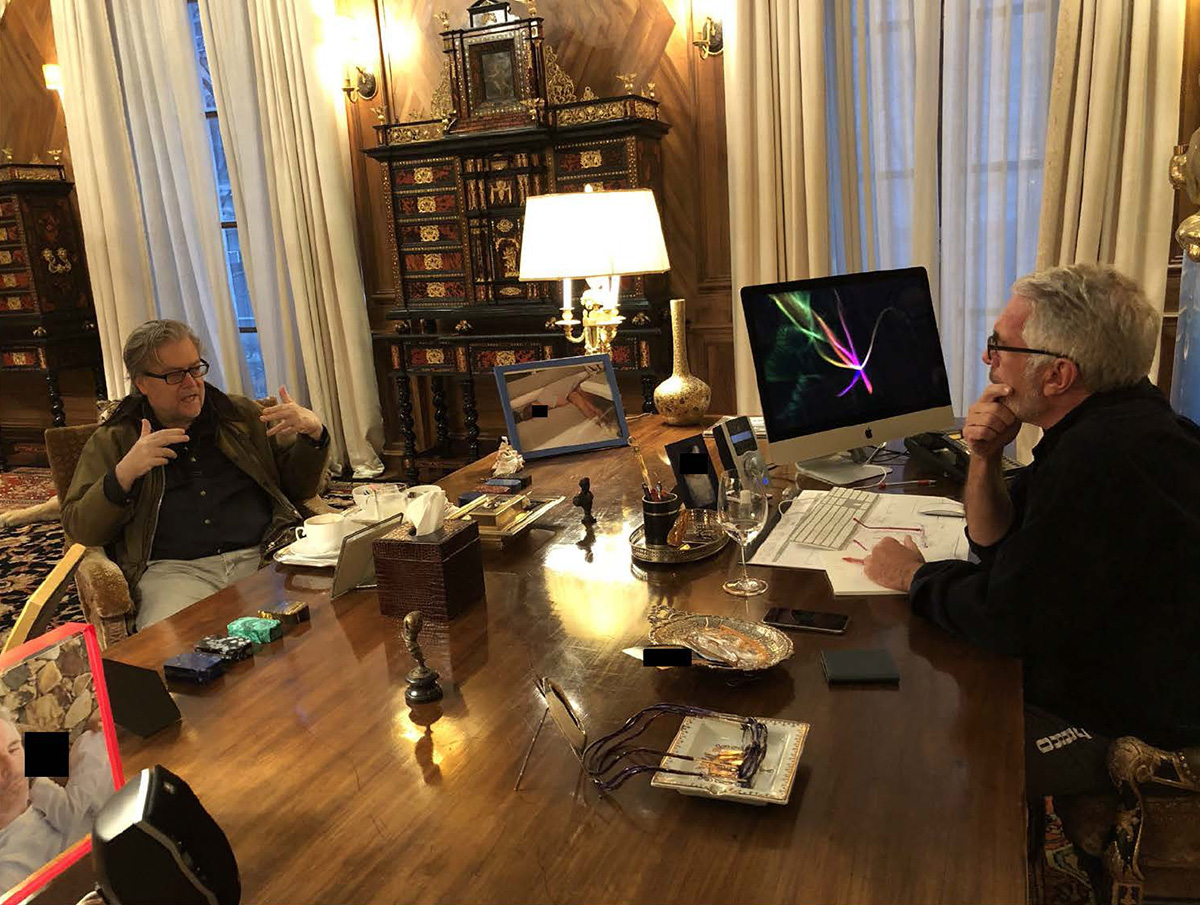
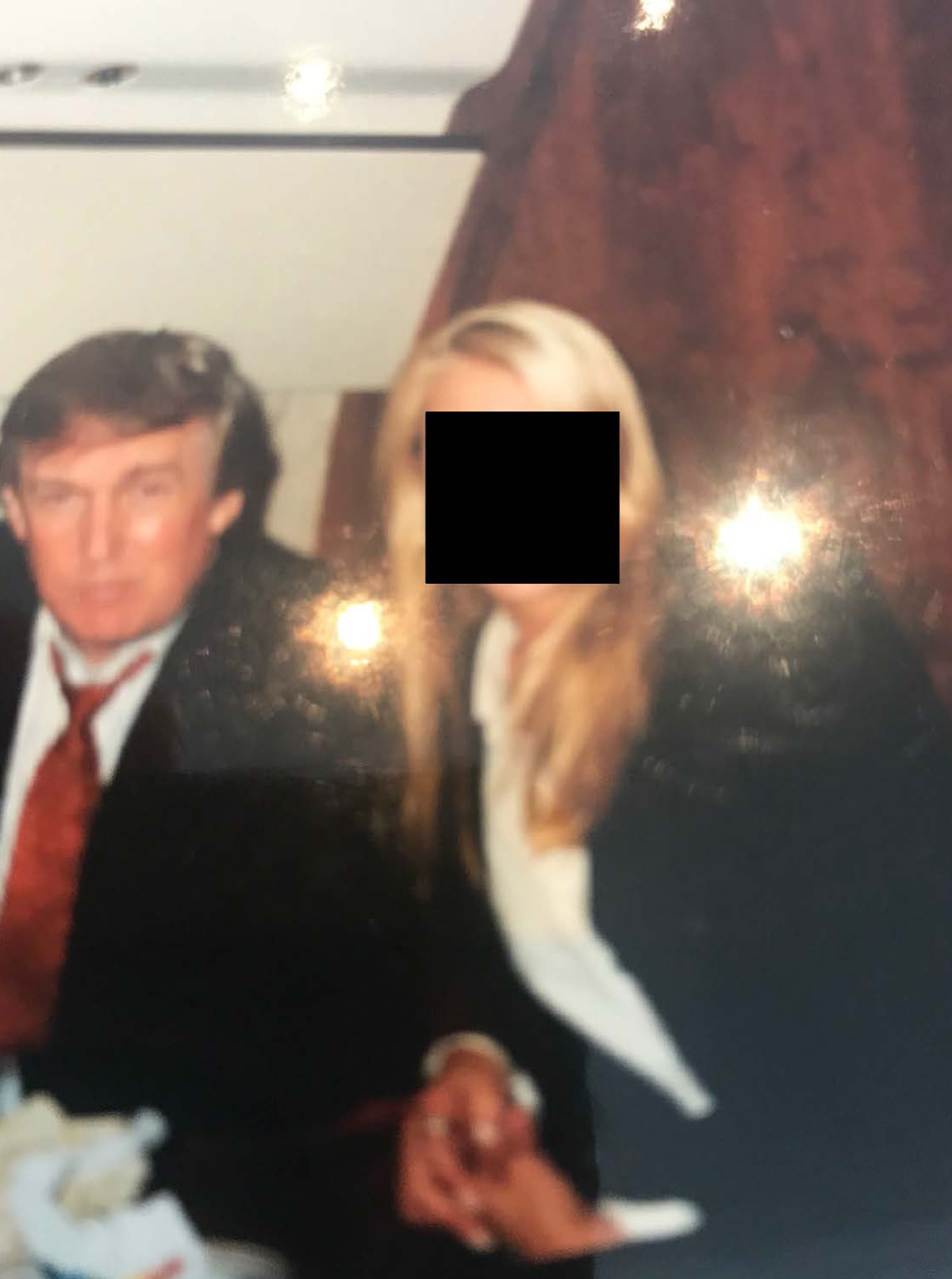

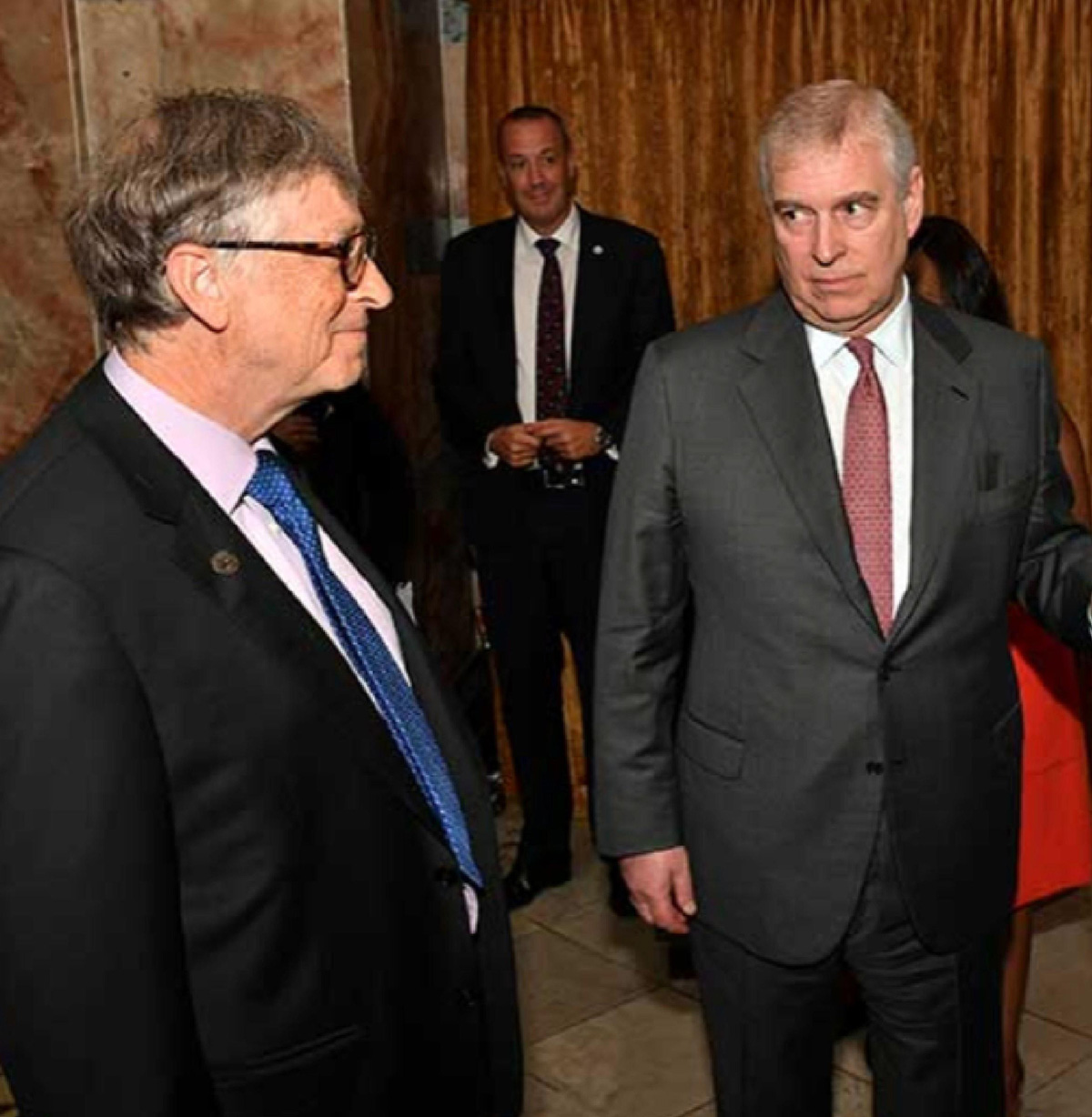
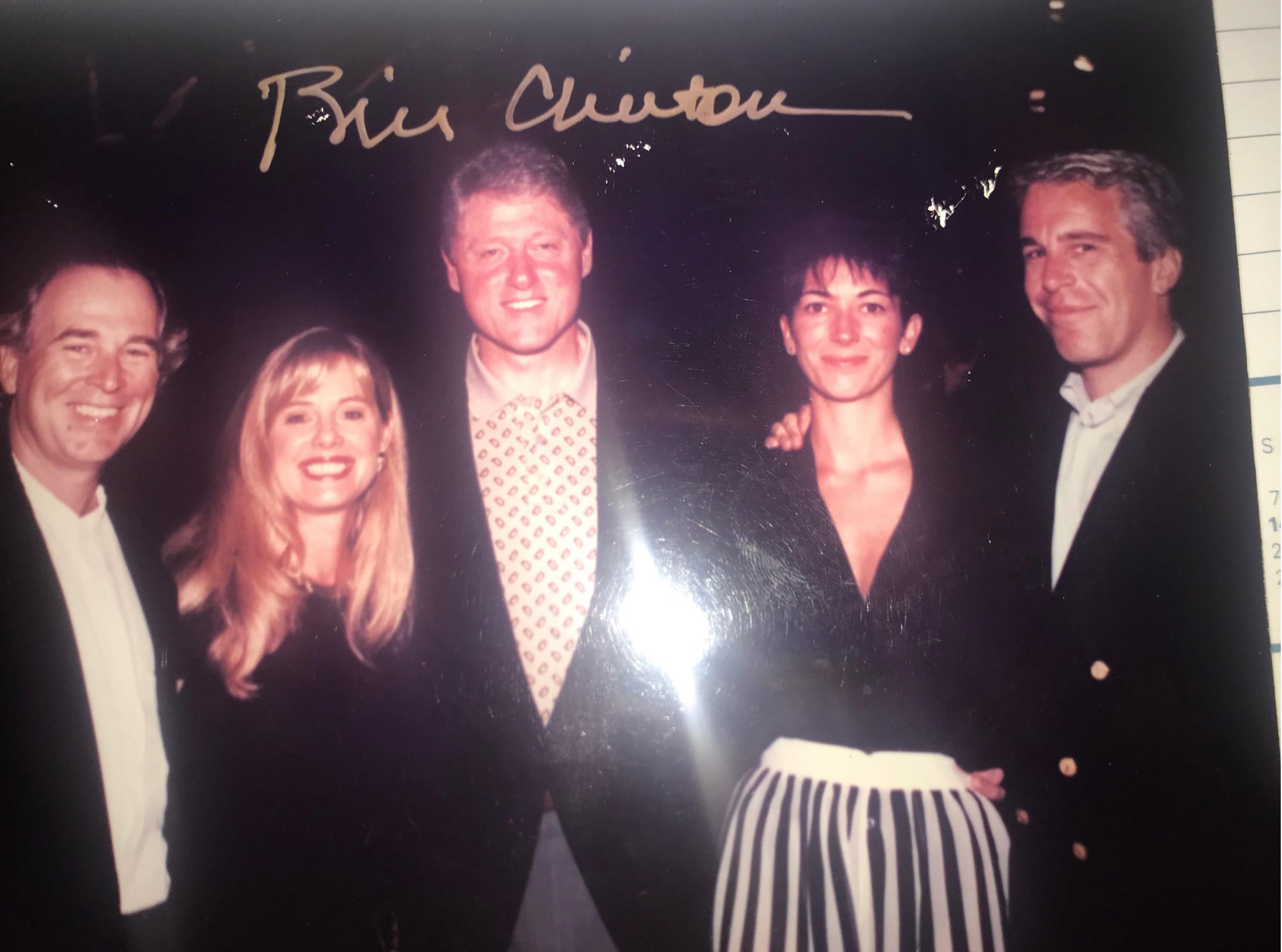
(Photo courtesy of the U.S. House Oversight Committee)
The White House
White House deadnames highest-ranking transgender official
Rachel Levine’s portrait altered at HHS

Admiral Rachel Levine — the first transgender person ever confirmed by the U.S. Senate and the highest-ranking trans official in American history — had her official portrait in the Humphrey Building altered, with staff replacing her correct name with her deadname, the name she has not used since 2011.
NPR first reported the change, and an HHS spokesperson confirmed to the outlet that Levine’s portrait had recently been altered. A digital photograph obtained by NPR shows Levine’s former (male) name typed on a placard beneath the portrait, placed under the glass of the frame.
Levine served as a four-star admiral in the U.S. Public Health Service Commissioned Corps under the Biden-Harris administration and was appointed the 17th assistant secretary for health.
During her tenure, Levine oversaw the Commissioned Corps and helped lead national public-health initiatives, including the federal COVID-19 response and vaccination strategy; efforts to address rising syphilis infection rates; HIV/AIDS prevention and treatment programs; and strategies to combat the opioid epidemic, particularly through expanded harm-reduction approaches for the communities most affected.
The Trump-Vance administration’s decision to publicly deadname Levine is widely viewed within the trans community as demeaning and disrespectful. The move comes amid a series of federal policy reversals targeting LGBTQ Americans, particularly trans youth seeking gender-affirming care.
Those actions include: weakening workplace protections for LGBTQ employees; limiting restroom access; downgrading gender-identity discrimination cases; pressuring hospitals to end gender-affirming care; cutting HIV research and prevention funding; removing LGBTQ crisis resources; restricting access to trans-inclusive medical policies for veterans and young people; supporting trans sports bans and threatening funding for teams that include trans athletes; and forcing schools and universities to eliminate DEI and LGBTQ offices, inclusive curricula, gender-neutral bathrooms, and books or training materials addressing LGBTQ issues.
The Trump–Vance administration has also expanded federal censorship by removing LGBTQ language from surveys, agency websites, Smithsonian materials, and human-rights reports; blocking Pride recognitions; creating federal communications that misgender trans women; imposing passport and travel barriers for trans Americans; lifting protections for trans service members; limiting benefits and care for LGBTQ veterans; and pressuring states, universities, and hospitals to end trans-inclusive policies under threat of losing federal research, education, or Medicaid funds. The administration has additionally deported LGBTQ asylum seekers to unsafe conditions, removed LGBTQ issues from global human-rights reporting, and escalated anti-trans rhetoric at public events.
These actions stand in stark contrast to Levine’s public-health record. As assistant secretary for health, she worked to expand LGBTQ+ health data collection, promote equitable vaccine distribution, strengthen national health-equity initiatives, and reduce care disparities experienced by historically underserved communities, including LGBTQ populations. Within HHS, she led councils and task forces dedicated to reducing structural barriers to care and improving community outcomes.
Before joining the federal government, Levine oversaw health and safety for nearly 13 million residents as Pennsylvania’s physician general from 2015–2017 and as Pennsylvania secretary of health from 2018–2021.

Asked by NPR about the alteration of her official portrait, Levine responded that it had been an honor to serve as assistant secretary for health, adding: “I’m not going to comment on this type of petty action.”
Health
The harsh truth about HIV phobia in gay dating
HIV and stigma remain baked into queer dating culture

Uncloseted Media published this article on Dec. 9.
This story was produced with the support of MISTR, a telehealth platform offering free online access to PrEP, DoxyPEP, STI testing, Hepatitis C testing and treatment and long-term HIV care across the U.S. MISTR did not have any editorial input into the content of this story.
By SAM DONNDELINGER | In his room, 19-year-old Cody Nester toggles between Grindr profiles on his phone.
As he senses chemistry with a match, he knows he has to flag something that could be a deal breaker.
“Did you see on my profile that I’m HIV positive?” he writes.
The reply arrives instantly.
“You’re disgusting. I don’t know why you’re on here.” Seconds later, the profile disappears, suggesting Nester is blocked.
“He went out of his way to say that. People could at least be more aware, ask questions, and understand the reality [of living with HIV] instead of attacking us,” Nester told Uncloseted Media.
“I would say 95 percent of people respond that way,” says Nester, who lives in Hollywood, Fla., and works at a Mexican restaurant. “The entire conversation is going fine. They’re down to meet up and then right when I mention [HIV], it’s always, ‘Oh no, never mind.’”
Some other messages he’s received include:
“You’ll never get anything in your life.”
“Why don’t you die?”
“Why are you on here?”
More often, it’s silence, a cold “No” or a sudden block.
“It’s like you’re a white fish in a school of black fish,” he says. “You’re immediately the odd one out.”
Even though Nester’s undetectable status makes it impossible for him to transmit HIV to partners during sex, he experiences stigma around HIV, something which nearly 90 percent of Americans agree still exists, according to a 2022 GLAAD report. And a survey shared in 2019 found that 64 percent of respondents would feel uncomfortable having sex with someone living with HIV, even on effective treatment. The emotional cost of this stigma is a significant barrier to intimacy and can result in a loss of self-esteem, fear of disclosure and suicidal thoughts.
What the science says — and why it doesn’t seem to matter
“The fear comes from antiquated ideas around HIV,” says Xavier A. Erguera, senior clinical research coordinator at University of California, San Francisco,’s Division of HIV, Infectious Diseases & Global Medicine. “A lot of people who are newly diagnosed still fear it’s a death sentence. Even though we have medications now to treat it effectively, and it’s basically a chronic condition, people haven’t caught up.”
Since 1996, antiretroviral therapies have developed to where they can suppress the virus to levels so low that it is undetectable in the blood, and thus not able to be transmitted to sexual partners. This is known as Undetectable = Untransmittable, or U=U. According to a Centers for Disease Control and Prevention report from 2024, 65 percent of HIV-positive cases are virally suppressed.
Another line of defense is pre-exposure prophylaxis (PrEP), which reduces the risk of acquiring HIV from sexual intercourse by roughly 99 percent when taken as prescribed. Approved by the Food and Drug Administration in 2012, the medication launched as a once-a-day pill and was hailed as a breakthrough as it transformed the sex lives of gay men, which had been shaped by decades of fear about HIV complications and about where AIDS came from.
“Internal logic doesn’t reflect what we know scientifically,” says Kim Koester, associate professor in the Department of Medicine at UCSF. “I was very optimistic when PrEP came out. The drug works, so why wouldn’t everyone use it?”
Even with PrEP use on the rise, less than 600,000 Americans used it in 2024, and Koester says skepticism and judgments about taking the drug persist.
“The phobia is pervasive,” Koester told Uncloseted Media. “People believe that others get the disease because of their lifestyle. … PrEP was supposed to be the antidote to the threat of HIV, reduce the anxiety, and make you more open to who you are and the sex you want. It’s supposed to be liberating. It is part of the answer. But it’s not enough. We don’t have enough people using PrEP for it to make the dent in the stigma we need.”
According to a 2023 study of seven informants living with HIV, public stigma stems from problematic views from society that those living with HIV are “a dangerous transmission source,” “disgraceful” and “violators of social and religious norms who have committed deviant behavior.”
Laramie Smith, assistant professor of Global Public Health at the University of California, San Diego, says this stigma is unwarranted and fueled by misunderstanding:
“With today’s treatments, it shouldn’t be a life-altering identity shift. It should be no different than, ‘I have diabetes.’ If you’re virally suppressed, it shouldn’t matter whether you’re friends with someone, whether you’re sleeping with someone — the science shows us that.”
How HIV phobia shows up online
Nester, who contracted HIV last year from a Grindr hook-up who insisted he was negative, says he is just starting to accept his diagnosis. “I didn’t go back on the apps for a long time after that. It messed with my mental health … realizing I’d have to take medication for the rest of my life.”
Since he started dating again this year, returning to apps like Grindr and Sniffies, he has faced a new normal. He tries to do everything “right” and disclose his status early. Even on his Grindr profile, he identifies as “poz,” slang for HIV-positive.
Still, he says most people ghost him once they find out. “The second I bring it up, it’s ‘No,’” says Nester. “The amount of discrimination you get … it’s always the same pattern. … People don’t know, and they don’t want to know. It messes with you.”
This discrimination may be fueled by a deprioritization of HIV awareness programs across the country. Earlier this month, the U.S. State Department did not commemorate World AIDS Day for the first time in 37 years. HIV prevention programs have been slashed, especially in conservative districts, and only 25 states and D.C. require both HIV and sex education. In many states, health curricula often lag behind current science and omit teaching about PrEP, gay sex and concepts like U=U. Research shows that Gen Z is currently the least educated generation about HIV.
“I could go all day explaining HIV, but people don’t want to listen,” says Nester, who is part of Gen Z. “People don’t want to learn about it; they just want to avoid it.”
HIV anxiety and public stigma shaped by history
Even in more progressive areas, stigma still exists. Damian Jack, a 45-year-old from Brooklyn, remembers sitting in an exam room in 2009 as a doctor explained how low his T-cell count was, which is a hallmark of HIV infection.
“I started hysterically crying,” he told Uncloseted Media. “HIV meant death. That’s what I thought.”
In 1981, when Jack was 1 year old, the first reports of a mysterious and deadly immune deficiency syndrome, which would later be named AIDS, appeared in the U.S. Growing up, Jack saw countless terrifying images of men on their deathbeds with Kaposi sarcoma, the purple lesions the media once called “gay cancer.” Public misinformation and fearmongering spread ideas that AIDS was a disease that “only gay men and drug users get.” And politicians often equated it with homosexuality and moral failure, calling it a “gay plague.” It wasn’t until September 1985, four years after the crisis began and thousands had died, that President Ronald Reagan first publicly mentioned AIDS.
Decades later, the emotional residue of that era and the shame associated with the virus lingers.
Hours after learning of his diagnosis, Jack faced his first encounter with rejection. He already had a date planned that night, and his doctor and friends encouraged him to go.
They had a great time until the date asked him: “Are you negative or positive?”
He told the truth.
“It was just understood there wouldn’t be a second date,” says Jack. “I remember thinking, ‘This is how dating is going to be now.’ I felt so anxious telling guys. It followed me everywhere. I don’t think that anxiety ever truly goes away.”
The emotional impact of HIV stigma
For those who are HIV-negative, experts say that “stigma’s whole design is to ‘other.’”
“The ‘us versus them’ creates that false sense of safety when it comes to HIV,” says Smith. “If I can believe that someone did something to deserve their diagnosis, and I’m not that [kind of person], then I’m safe.”
This othering is painful and can lead to shame, fear and isolation, and it is linked to a higher risk of depression and anxiety.
“If I’m undesirable, and that’s what those messages are communicating, that threatens your sense of safety, your sense of belonging and the fundamental desire we all have to be loved,” Smith says. “And that starts to reinforce the thinking that ‘I am not worthy. This virus that I have means that I’m not lovable. I am not safe showing up among other men.’”
“I pretend it doesn’t hurt, but some things do sting a little bit,” Nester says. “You start thinking, ‘Am I really that disgusting? Am I really that singled out?’”
When public stigma turns inward
“Internalized stigma is what occurs when applying the stereotypes about who gets HIV, the prejudice, the negative feelings, onto yourself,” says Smith.
In 2024, 38 percent of people living with HIV reported internalized stigma. And studies show that it can predict hopelessness and lower quality of life, even when people are engaged in care or virally suppressed.
Internalized stigma can also affect how people practice safe sex and communicate about the virus. A 2019 survey of men who have sex with men found that individuals who perceived greater community-level stigma were less likely to be aware of — and use — safer-sex functions available on dating apps, such as HIV-status disclosure fields, as well as sexual health information and resources.
“[HIV phobia] is probably the most intense, subvert bigotry I think you could experience,” Joseph Monroe Jr., a 48-year-old living in the Bronx, told Uncloseted Media.
On dating apps, men have messaged him things like, “You look like you’ve got that thing” and “Go ahead and infect someone else.”
Monroe has also dealt with misinformed people who rudely opine about how he contracted the virus: “Who fucked you? That’s how you got it, right?” people will say to him.
“You end up internalizing all these stereotypes about who gets HIV — that you were promiscuous, that you didn’t care about yourself, that you did something wrong,” says Smith. “You carry that in, and then you have to relearn: ‘No, I didn’t. This is just a health condition.’”
What HIV acceptance looks like and raising awareness
For those living with HIV, acceptance feels far away.
“You’re living under this threat of HIV and the threat that others find you threatening. It inhabits you socially and sexually,” Koester says. “People are hunkering down. Not putting themselves out there and having a mediocre quality of life. To have a sense of empowerment, you have to be legitimate and seen in the world and it’s hard to do that with the stigma that exists.”
Researchers say the path forward lies as much in conversation as in medicine.
Koester says she talks about HIV and PrEP anywhere she can, including in salons, cafes and restaurants. “Whenever I get into a cab with someone, I’m going to bring up HIV so the driver gets accustomed to hearing about it. … We have a long way to go in terms of exposure and awareness and every little bit helps.”
Part of this lies in increasing awareness through targeted marketing campaigns. PrEP is still profoundly misunderstood outside major urban centers, with uneven uptake among minority groups and usage gaps in the Bible Belt. And a 2022 U.S. survey found that 54.5 percent of people living with HIV didn’t know what U=U meant, and less than half of Americans agree that people living with HIV who are on proper medications cannot transmit the virus.
While eradicating stigma is slow, there is hope for acceptance.
Years after Jack’s diagnosis, in 2021, he told a man he was on a third date with that he was HIV-positive but undetectable. His date’s reply was almost casual:
“Oh — is that it? I thought you were going to say you had a boyfriend or something. I’m on PrEP. You’re fine.”
“It felt so good to hear him say that and accept me,” says Jack. “I was like, ‘This is my person. You’re my person.’” One year later, they got married.
Back in Florida, 19-year-old Cody Nester isn’t feeling this acceptance. He still scrolls past profiles that read “Only negative guys” and tries to ignore the hateful messages.
“It still hurts, but I know it’s coming from fear,” he says. “I wasn’t too informed about HIV before I got it. … When I got it, I really jumped into the rabbit hole and began to learn. I really do think [HIV and stigma] is because people are not knowledgeable. … When people don’t know details, they tend to get scared.”
Additional reporting by Nandika Chatterjee.



